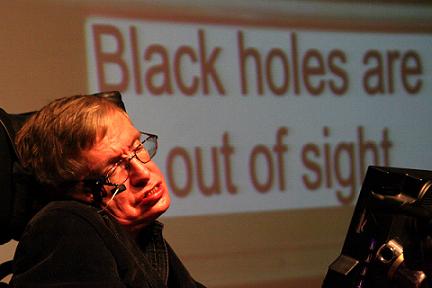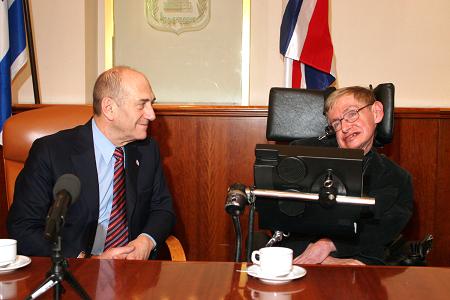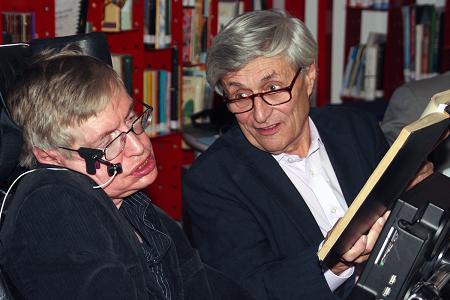Hawking, began his visit in front of a hall full of teenagers from all over the country, and he preferred to tell them about his scientific work

Hawking and a slide of the sticker pasted on the door of his laboratory, yesterday at the Science Museum in Jerusalem - black holes are out of bounds. Today he no longer thinks so. The photos are courtesy of the British Embassy in Israel.
The universe is the most wonderful thing to explore. This is evident from Stephen Hawking's lecture to teenagers yesterday at the Bloomfield Science Museum in Jerusalem. The museum was filled to the brim with young people who excel in science, and for some of them, who could not enter the hall, a solution was found in the form of closed-circuit video transmission on the entrance floor of the museum.
Hawking arrived about an hour late, accompanied by his research team members and personal assistants as well as his Israeli entourage. At the beginning of his lecture, Hawking said that he considered working with Fred Hoyle at the beginning of his career. Hoyle was one of the greatest astrophysicists in Britain, but also one of the last defenders of the steady state theory. He then said that luckily for him, Hoyle had no possibility of accepting students and he was referred to a Swedish astrophysicist who was then unknown - Denis Siama, since otherwise he would have had to defend this theory which, although it made some prophecies that could be confirmed, was never able to survive, because it required Constant production of matter and energy, and its whole advantage was that it did not need a starting time for the universe, something that was then left to the grace of religion alone. In any case, at that time there were two options in physics - cosmology and particle physics. The first Torah has been frozen in its preservation since the XNUMXs and Einstein's work on general relativity, while the living and active Torah was particle physics. He decided to choose cosmology.
Hawking and the chairman of the Science Museum, Prof. Hanoch Gutfreund
Hawking became famous in the world of physics when he provided a mathematical proof of the Big Bang theory. This theory showed that the entire universe expanded from a singoric point - a very tiny point in terms of its size, but with an infinite gravitational force. Hawking was able to prove this using mathematical techniques developed by Roger Penrose (and, among other things, caused astonishment, Hawking said in his lecture, thanks to the use of the incomprehensible words - Imaginary time). According to him, it is simply another dimension of the universe, just like the three dimensions of space and the time).
However, Penrose's techniques were not developed to treat the beginning of the universe but black holes. Scientists have long predicted that if a large enough star collapses at the end of its life, all the material remaining in the star will collapse into an infinitesimal point and have infinite gravity - a singular point. Hawking realized that the entire universe is actually a black hole in the middle of nowhere, instead of matter collapsing into a singular point, the entire universe began at a singular point and expanded to create everything we see around us today - from stars to planets and humans. Hawking realized that to reach a complete understanding of the universe, he must uncover the mysteries of black holes.
According to Hawking, in the next decade, the subject was studied in depth, and physicists began to understand the nature of black holes, but Hawking believed that something was missing. All the work on black holes up to that point used the physics of the large scale of the universe - general relativity and ignored the physics of the smallest - quantum theory. Hawking decided to combine these two branches of physics, something no one had tried before. He developed a new way to force quantum physics to live in peace with Einstein's theory of relativity in the immense gravitational environment of the black hole. Within a few months he came to an exciting conclusion: his beacons showed that there are things coming out of the black hole. It seemed impossible - the only thing scientists thought they knew about black holes was that nothing, not even light itself, could escape them.
"I went back and checked the equations and I was convinced that I was right. I understood that a certain radiation comes out of the black hole and this led me to understand that this radiation (later it was called Hawking radiation) causes black holes to evaporate and finally disappear."
Although the theory about the evaporation of black holes was revolutionary, it became accepted, but Hawking realized even then that his work had much more fundamental implications.
In 1976 he published an article in Physical Review entitled "Failure of Predictability during Gravitational Collapse". In this paper Hawking realized that not only the black hole disappeared. He said that all information about what happened to the black guy is also gone. Hawking's conclusions are true not only for black holes but for all physical processes. No longer a direct link between cause and effect, physics could collapse.
Since that article dealing with the information paradox, the matter has become one of the most difficult problems in physics. The physicists divided into two camps - those who believed that Hawking was wrong and that the information could not be lost and the others who believed that physics should be rewritten to take into account the lack of acknowledgment of the information that Hawking revealed. For 20 years, the debate heated up. Neither side agreed to admit defeat until a paper appeared written by a young Argentine mathematician - Juan Maldana. This study claims a mathematical proof of what happens inside black holes - and showed that the information is not lost. Hawking, it seems, is on the losing side. Hawking sat down to write together with the young researcher Chris Gallfard, to try to refute Maldenka's article. They believed that they could use the same mathematical techniques that Medalcana used to prove that the information was lost. However, after two years of work, they still haven't been able to prove their theory.
Meanwhile, Hawking's condition worsened. He fell ill with pneumonia and was rushed to the hospital and the doctors feared for his life. Hawking was hospitalized for over three months, but while everyone around him worried about his health, Hawking continued to think, and finally, he got up from his sick bed and announced that he had solved the problem that had been bothering him for the past thirty years and found a solution to the information paradox.
Hawking recovered and returned to work. Then, in July 2004, at one of the most important conferences in physics, Hawking made a dramatic announcement. He claimed to have solved the information paradox, but to the surprise of many he did not defend his long held belief that information is lost in the black hole. Instead, he said he could prove the opposite. However, there are still unconvinced judges.
"It's like burning an encyclopedia. The information exists, in the form of ashes, but it is difficult to read it," he said yesterday at a conference in front of the Israeli youth.
According to him, he is happy about his modest contribution to the field of cosmology that has developed in the last 40 years. To conclude his words, he decided to say a less educational sentence. He compared these discoveries to the type of "eureka" as something similar in feeling to sex, but it takes much longer.
After that, Hawking answered the questions of three high school students from around the country, and called them to come and continue researching in the various fields of science. In response to the question of the student Salim Sabag, 17 years old from the Baptist school in Nazareth, whether there is proof of the existence of the Big Bang and whether the laws of nature that prevail today are similar to the conditions that prevailed then, Hawking replied: "The basic assumption of science is that the universe is governed by the laws of science, which can be expressed through Mathematical equations. The variation in the laws of nature from place to place can be explained by the existence of a field that changes in place and time. However, such a field, if it existed, would have to have properties with which we could discover it. Therefore there is no evidence that the laws of nature have changed.
Yonatan Shelah, 17 years old, a XNUMXth grade student at the Lady Davis School in Tel Aviv who is studying advanced physics at the Center for Scientific Education in Tel Aviv (Hamad'a) asked: Two years ago you announced that you were backing away from a theory you had supported for thirty years. How is this possible? "Many people claim that information is trying to escape from the black hole but has no way out. I have thought about the problem for thirty years and I believe I now have an answer to this question. "Scientists don't admit mistakes as often as they should, but they admit mistakes more often than politicians."
David Ben Tov, XNUMXth grade student from Yavneh: Why did you choose cosmology?
"I decided to research in the field of cosmology because I wanted answers to the big questions - where did we come from, why are we here, and I encourage the young to do like me. There is something in revelations, when you discover something that no one knew before you."



5 תגובות
This is an Israel hater who supported an academic boycott of Israel.
Zen is his "modest" contribution as far as I'm concerned.
Because the pace of speaking in this way is quite slow, the lecture is pre-recorded
There are many chances in my opinion that within a few days you will be able to find the video on the website -
http://www.YouTube.com
Already now you can find many videos with his lectures here -
http://www.youtube.com/results?search_query=Stephen+Hawking
Successfully
Why don't you have a link to the clip of the lecture Hawking gave at the science museum in front of the students? After all, the lecture was filmed and broadcast live on YNET.
YNET shelved the video they took, I expected you to behave differently and make sure that the video could be seen again through you.
Peace,
I understood that Hawking is completely paralyzed in his whole body, so how does he activate the computer with which he speaks? Is it done by blinking eyes? Because I didn't notice that he was blinking while he was lecturing.
Another question, are there other paraplegics in the world besides Hawking who use a talking computer of this kind? I have never seen a paralyzed person other than Hawking using such a computer.
Thanks in advance.